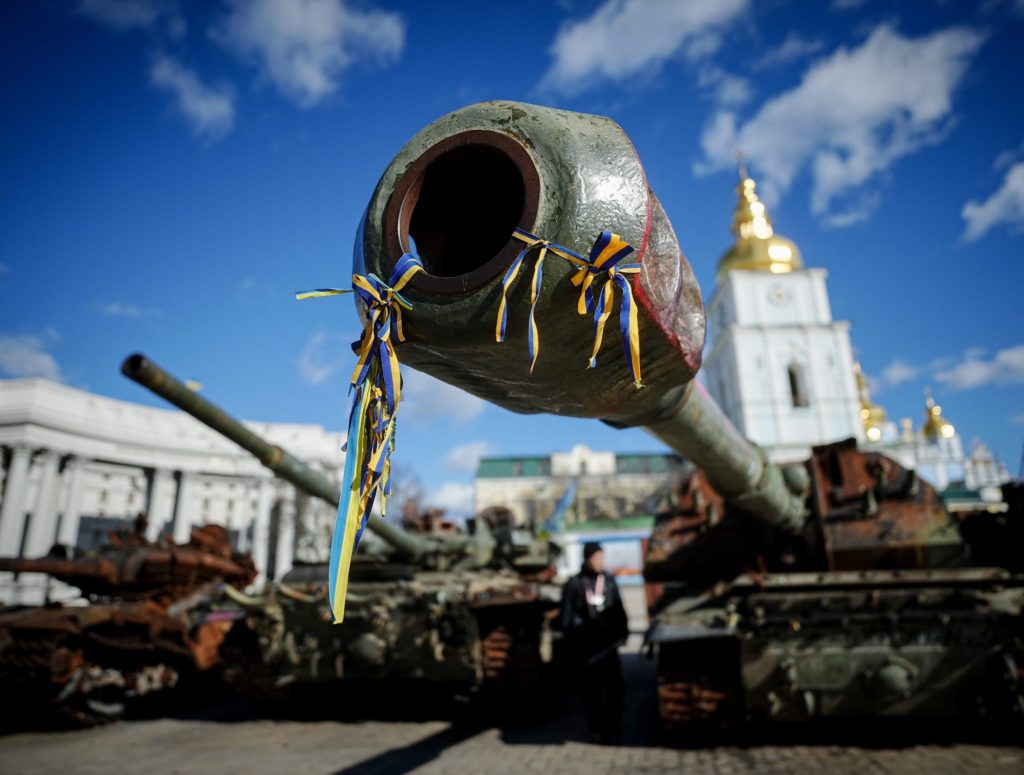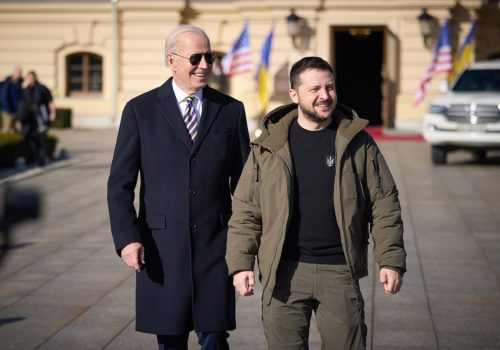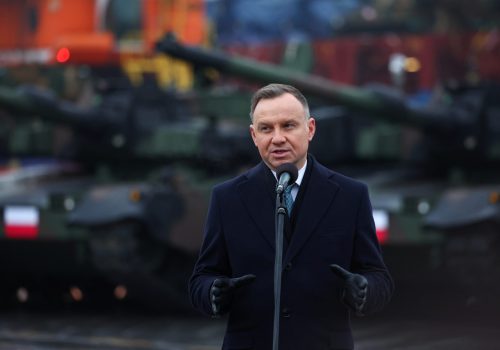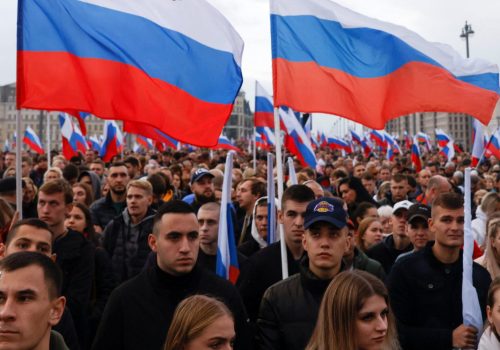For the past twelve months, Ukraine’s remarkable resistance to Russian aggression has captured the imagination of the watching world. The international community has been been amazed by the resilience of the Ukrainian people and inspired by their determination to defy the Russian colossus. At the same time, as the invasion enters its second year, calls are now mounting for some kind of compromise with the Kremlin that would end the fighting and effectively freeze the conflict.
Most advocates of a compromise peace argue that a complete Ukrainian victory is simply not realistic and insist that even a bad peace is better than more war. While often vague on details, they typically hint at some kind of land-for-peace deal that would involve Ukraine giving up part of its sovereign territory and condemning millions of Ukrainian civilians to permanent Russian occupation in exchange for an end to hostilities.
Such wishful thinking conveniently underestimates the extent of Vladimir Putin’s imperial ambitions while ignoring the grave implications for international security of anything less that a decisive Russian defeat in Ukraine. If Moscow is rewarded for the invasion of Ukraine with territorial gains, the world will become a far more dangerous place. Perhaps the best way to illustrate the perils of appeasing Putin is by imagining where we would be today if Ukraine had indeed fallen one year ago.
Stay updated
As the world watches the Russian invasion of Ukraine unfold, UkraineAlert delivers the best Atlantic Council expert insight and analysis on Ukraine twice a week directly to your inbox.
Since the invasion began on February 24, 2022, a combination of captured documents, prisoner accounts, Russian propaganda messaging, and the conduct of the Russian military in occupied Ukrainian regions have made it possible to piece together a fairly comprehensive vision of Putin’s plans for a conquered Ukraine. The chilling picture that emerges is of a genocidal campaign to not only extinguish Ukrainian statehood but wipe out all traces of Ukrainian national identity.
If Putin’s initial invasion plan had succeeded and his troops had captured Kyiv in three days as anticipated, he would have deposed the government and installed a puppet regime drawn from Ukraine’s pro-Kremlin political forces. Much of the country would have quickly come under direct Russian military control and would have been subjected to months of mass arrests, summary executions, and forced deportations designed to break all resistance. Working with local collaborators across the country, the Russian occupation authorities would have targeted anyone viewed as a potential threat to the Kremlin.
This pattern of atrocities has been repeated systematically over the past year in every region of Ukraine occupied by Putin’s troops. International investigators have concluded that the crimes taking place in occupied regions are evidence of a “calculated plan” to destroy the Ukrainian nation. “Putin’s plan is to occupy Ukraine, subjugate the Ukrainian population to Russian rule, and destroy Ukrainian identity. This plan is becoming clearer as the evidence of war crimes proliferates and as our investigations progress,” commented British barrister Wayne Jordash, who leads the Mobile Justice Team of international lawyers investigating possible Russian crimes in Ukraine.
With less than 20 percent of Ukrainian territory currently occupied by Russia, the humanitarian consequences of the war have already been disastrous. Tens of thousands of civilians are feared dead and over a million have been subjected to forced deportation to the Russian Federation. Meanwhile, millions more have had to flee their homes and move elsewhere in Ukraine or cross the border into neighboring EU countries.
If Putin had managed to seize the whole of Ukraine, the scale of the humanitarian catastrophe would have been far greater. Tens of millions of Ukrainian refugees would have flooded into the European Union, while ongoing acts of resistance inside Ukraine would have led to a bloodbath of increasingly savage reprisals designed to terrorize the population into submission. Global audiences would have witnessed the previously unthinkable spectacle of a modern genocide unfolding methodically in the heart of Europe and livestreamed on social media.
Eurasia Center events

The negative implications of a Russian victory in Ukraine would not have been limited to the captive Ukrainian population, of course. On the contrary, the repercussions would have been felt far beyond the borders of Ukraine, shaping the geopolitical climate for years to come and destabilizing the entire world.
The most immediate consequence would have been additional Russian wars of aggression. Success in Ukraine would have encouraged Putin to continue, with Moldova and Kazakhstan among the most obvious next targets. Sooner or later, the emboldened Russian dictator would test NATO’s commitment to collective security. Would the likes of France and Germany really risk World War III in order to defend Estonia? If Russia is not stopped in Ukraine, that is a question all NATO members will probably have to answer in the not-too-distant future. At this stage, it seems reasonable to assume that Putin is far from convinced.
Nor would Russia be the only threat on the horizon. The fall of Ukraine would undermine the core principles of the global security order and inspire other authoritarian regimes around the world to engage in their own foreign policy adventures. In the wake of a successful Russian invasion of Ukraine, a Chinese assault on Taiwan would become far more likely, while autocrats everywhere would draw the logical conclusions for their own neighborhoods.
A Ukrainian defeat could also have sparked an unprecedented international scramble for nuclear weapons. Even before Putin’s full-scale invasion, the preceding eight years of Russian aggression against Ukraine had already highlighted the folly of the Ukrainian government’s 1994 decision to unilaterally hand over the world’s third-largest nuclear arsenal in exchange for security assurances from Russia, the US, and the UK. If Russia had achieved its goal of extinguishing Ukrainian statehood, many countries would have begun looking nervously at their neighbors, with some deciding that the only truly reliable security guarantee was a nuclear arsenal of their own.
The aftershocks of a successful Russian blitzkrieg in Ukraine would have proved hugely damaging for the future of democracy itself. Putin’s triumph would have discredited the democratic world and reinvigorated authoritarian regimes around the globe. From Central Asia to the Balkans, the often fragile democratic progress of recent decades would have given way to a fresh wave of authoritarianism drawing its legitimacy from the new geopolitical realities created by Russian victory in Ukraine. Populism would have reached new heights throughout the West, with the likes of Hungary’s Viktor Orban emerging as key beneficiaries.
This nightmare vision of a world marked by chronic international instability, wars of aggression, nuclear proliferation, and rising authoritarianism is still a very real possibility. Russia continues to commit genocide in those parts of Ukraine under its control, and remains as determined as ever to replace the rules-based international order with a system where great powers can dictate to their weaker neighbors. The only way to avoid this dystopian future is by ensuring that Putin’s attempt to destroy Ukraine ends in failure.
The many people currently proposing peace plans may well have good intentions, but they are delusional if they believe Putin will be satisfied with relatively modest territorial gains in eastern and southern Ukraine. In reality, any concessions will merely whet his imperial appetite while convincing him of the West’s fundamental weakness. The Russian dictator is already openly comparing his invasion to Czar Peter the Great’s eighteenth century wars of imperial conquest. If Putin is rewarded for his aggression in Ukraine, he will inevitably go further.
Rather than insisting on a premature peace, it would make far more sense to actually listen to Ukraine. Nobody wants peace more than the millions of Ukrainians who have seen their lives shattered and their country devastated by Russia’s criminal invasion. It is therefore particularly revealing that there is virtually zero support in today’s Ukraine for a negotiated settlement. Ukrainians are under no illusions over the difficulties of achieving victory. Nevertheless, they also understand the nature of the current Russian regime and recognize that unless Putin is decisively defeated, he will continue to wage war against their country and the wider democratic world.
Luckily, Ukrainians are ready to do the fighting themselves. Last year, their valor prevented the world from plunging into a new dark age of authoritarian aggression. All they ask now is for the international community to remain steadfast in their support and give Ukraine the tools to finish the job.
Peter Dickinson is Editor of the Atlantic Council’s UkraineAlert Service.
Further reading
The views expressed in UkraineAlert are solely those of the authors and do not necessarily reflect the views of the Atlantic Council, its staff, or its supporters.

The Eurasia Center’s mission is to enhance transatlantic cooperation in promoting stability, democratic values and prosperity in Eurasia, from Eastern Europe and Turkey in the West to the Caucasus, Russia and Central Asia in the East.
Follow us on social media
and support our work
Image: Russian tanks captured by Ukraine stand on Mykhailivska Square in central Kyiv. (Kay Nietfeld/dpa)




